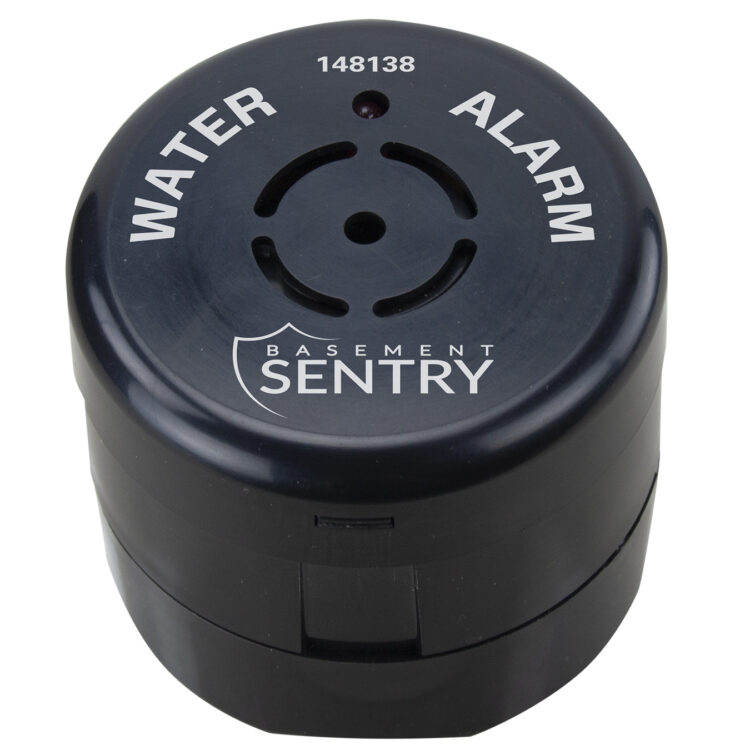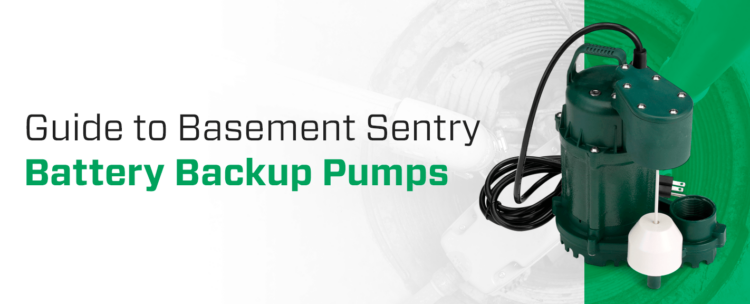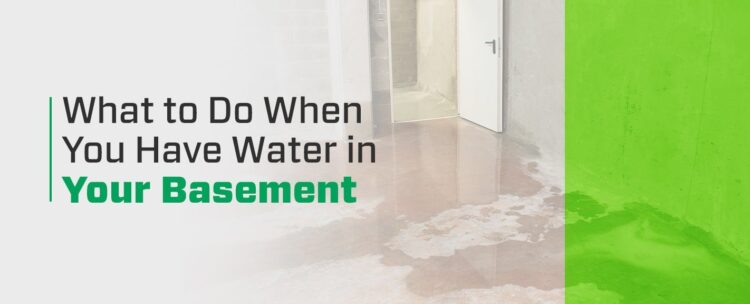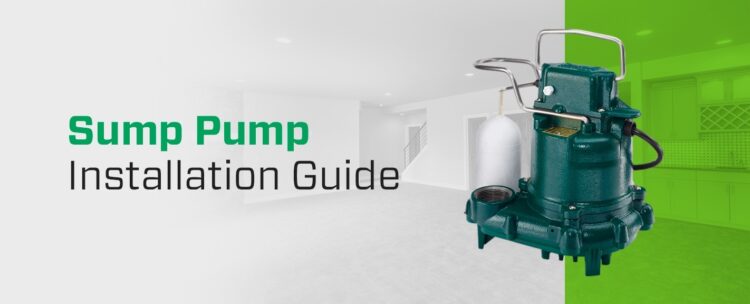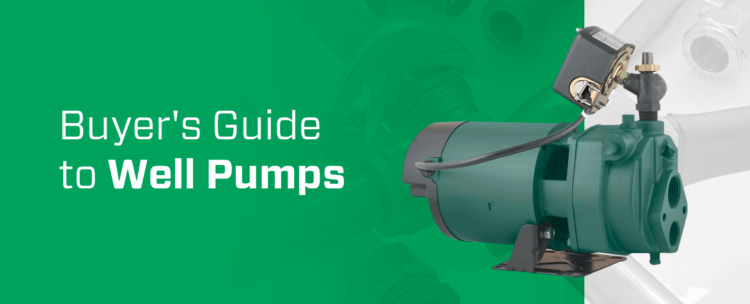Every homeowner dreads the thought of coming home to a flooded basement. Stormy weather, leaking or burst pipes, landscape sloping, clogged downspouts, foundation flaws and storm sewer backups are just a few causes of basement floods. These are just a few of the causes fo basement floods. However, unless you’re sitting in your basement waiting for it to happen, there aren’t many noticeable warning signs that a basement is about to flood.
How can you stop a flood before it starts if those signs don’t exist? Basement sentry products are designed to aid the prevention of basement flooding. In this category of products, high-water alarm systems, sump pumps and backup sump pumps are valuable investments for homeowners with basements.
In this article, we’ll explore the benefits of high-water alarms and discuss the role of basement sentry products in keeping your home dry.
How Do High-Water Alarm Systems Work?
A high-water alarm system consists of a main, wall-mounted alarm and sensors installed on the floor. When water touches the sensor’s radius, it will signal the central alarm. With some models, you’ll receive a notification on your phone. High-water alarms can detect even the smallest amount of water on the basement floor, plus water below the floor.
Advantages of Using High-Water Alarm Systems
High-water alarm systems are a simple and relatively budget-friendly way to help homeowners prevent flooding damage before it becomes unmanageable. Here are some of the most valuable benefits these devices have to offer:
1. Mitigate and Prevent Basement Flooding
These alarm sensors can detect water levels below the floor so you can act before it starts pooling in. When the alarm sounds, you can act quickly to shut off the water supply and call a plumber. This way, they can find and fix the leaks before damage occurs.
2. Fix Sewer and Drain Backups
Grease buildup and other blockages can clog drain systems. If you neglect those blockages, water can flood the basement, damaging your belongings and property and leading to potential health concerns such as mold.
Avoiding clogging your home’s drain systems is essential. Pouring oil and grease down the drains, flushing foreign objects down the toilet and leaving hair fall to clog up shower and bath drains are all common ways drain systems become clogged.
In addition to taking those steps, installing a water alarm is a surefire way to detect changes in water pressure that could signal a blockage in your plumbing system, giving you time to unclog the drains before flooding occurs or becomes a more extensive problem.
3. Avoid Burst and Frozen Pipes
When basements flood, burst pipes become a costly concern. When water pressure increases too much, the risk of pipes bursting and consequentially flooding the space is high.
High-water alarms will alert you when water flow levels change so you can shut off the water and identify the problem in time. Some models can detect moisture levels in plumbing systems to activate a pipe heating system. These models help prevent pipes from bursting in the winter when they would otherwise freeze.
4. Find and Fix Leaks
Even the smallest pipe leak can cause wall and floor rotting, mold and mildew growth, and rising dampness. Fortunately, high-water alarm devices can detect even the slightest change in water flow, which could indicate a leak. As a result, you can inspect your plumbing system or contact a plumbing professional before flooding devastates your property.
5. Prevent Mold and Mildew Growth
Mold and mildew growth can set in when water starts seeping into your basement. Moisture will rise through the walls and create the ideal conditions for mold. Neglecting to address mold in your home can lead to numerous health hazards for you and your loved ones.
If you don’t have a high-water alarm system in your basement, you will likely only notice flooding when it’s already too late. When the floor of your basement is covered in water, mold growth will soon follow and can threaten your and your family’s health. Moreover, structural irregularities and damage from rising dampness become a concern.
Since water alarms will alert you as soon as they detect notable water levels, you can take action before water damage leads to mold growth.
The Different Types of Water Alarms
Many water alarm systems are available on the market, but these are the two primary types of high-water alarms you can choose between:
- Passive alarms: These devices offer similar functions to smoke detectors — they will set off an audible alert when the sensors get wet. However, passive alarms may only be helpful when someone is around to hear the alert, and they work best in areas of the home where leaks might occur, like near the water heater, washing machine, dishwasher or bathrooms.
- Active alarms: Unlike passive alarms, active alarms can prevent flooding and leaks from causing damage. These alarms detect changes in water flow and set off an alarm before flooding occurs. Moreover, these alarms can shut off the water flow altogether, as they connect to the main water valve.
While passive alarms are a practical choice, active alarms are ideal for homeowners who spend a lot of time out of the house. Passive alarms require you to shut off the water flow before contacting a plumber — active alarms will turn the water valve off automatically.
Tips to Choose the Best High-Water Alarm for Your Basement
Regardless of whether you decide to choose an active or a passive water alarm, look for these valuable features when comparing water alarm systems:
- Multiple sensor connection capabilities: The most suitable high-water alarm systems will enable you to connect at least two remote sensors to the central alarm. With more sensors, you can monitor a larger floor area for water. A few great places to install sensors are near sump pits, floor drains and water heaters.
- A loud alarm: Look for models with an 85-decibel or louder alarm. This pitch is comparable to noise levels from hair dryers, blenders and lawnmowers. Because some water alarm models have quieter alarms, confirming the alarm’s pitch is essential. Zoeller at Home’s high-water alarm has a 110-decibel alarm, which is loud enough to hear from outside a home.
- A lasting battery and a low battery alarm: Water alarms operate with battery power. Devices with a 9V battery are a good choice for reliable power. Be sure to look for water alarms with a low battery indicator. The device will alert you the moment you need to change the battery, so you can ensure the alarm is always operational.
- Easy mounting design: Installing the main alarm unit onto a wall makes it accessible, but you can also install the alarm onto pipes. A versatile mounting design makes it possible to install the alarm in the most suitable location in the basement.
How a Quality Sump Pump Can Help with Flood Prevention
Even though water alarm systems can help you prevent and manage flooding, these devices should not be your only means of protection from water damage.
Many homeowners would agree that sump pump systems are essential in all basements. A sump pump is an innovative device that can remove water from low points on your property, like the basement, and force it out through a drainage space to prevent flooding. There are three primary types of basement sump pumps — pedestal, submersible and battery backup sump pumps.
Sump pumps stay in standby mode until the water level rises. Then, the pump’s valve activates and signals the motor to start pumping the water. They also typically have alarms that alert you when water levels rise, or the pump is backed up. This way, you always have an idea of what’s going on with your sump pump.
However, sump pumps alone are not foolproof measures to prevent flooding, as they have the potential to fail. The most common reasons these devices fail include power outages, equipment failure, a stuck float switch and pump overload. Installing a battery backup sump pump in addition to your first sump pump can help ensure protection even when the power goes out, but other issues can still occur that cause the sump pump to fail.
Investing in both a high-quality sump pump and a high-water alarm will amplify your protection against basement flooding. Modern sump pump systems offer built-in Wi-Fi and notification capabilities to offer homeowners peace of mind, even when they’re away from home. If the sump pump fails to sound an alarm or send an alert for whatever reason, the water alarm will pick up the slack.
Steps to Take if Your Basement Floods
A functional sump pump, a backup sump pump and a quality high-water alarm are great defenses against flooding. Here are some steps to take if a flood does occur.
- Shut off the water valve: When you notice water covering the basement floor, the first action is to shut off the water valve. This valve is usually located where the water line enters your home, next to the water meter. It may be located in the basement or a crawl space on the front of a property. Shutting off the valve will stop the flooding if the reason for the flooding is the pipes.
- Turn off the circuit breakers: A flooded basement poses an electrical hazard. For this reason, you must turn off the circuit breakers in the basement. If you cannot locate the breakers due to excessive flooding, contact an emergency electrician to assess the area for water removal. Do not attempt to enter the basement if flooding is severe.
- Move possessions to a dry area: If the flooding is minor, move your possessions to a dry area. However, bear in mind that you must wear protective gloves and other PPE, as sewage contamination can be a concern. If items have been standing in water for some time, it’s best to contact a professional service for removal rather than risk consequences to your health.
- Remove water: In cases of mild flooding, you can start removing water with shallow buckets or containers and soaking up water with a mop. However, if flooding is severe, avoid attempting to remove the water on your own. Contact a professional to pump out the water if water levels are high.
- Dry the space: You must aid the drying process once all the water is removed. Because basements are located below ground level, there’s less chance of the sun and airflow drying out the space. Instead, you will need to use fans, industrial blowers and dehumidifiers. Properly drying a basement following a flood can take up to six weeks. If there’s still notable dampness after six weeks, you should reach out to a plumbing service to remedy the issue.
You can clean up a flooded basement on your own if the water levels are minimal, though it’s usually best to contact professional services to clean and sanitize the space.
Defend Your Home Against Flooding with Zoeller at Home Products
The cost implications of a flooded basement are often surprising. Between plumbing repairs and cleanup services, even a minor flood can be a major financial setback for any homeowner. Plus, insurance doesn’t always pay out for flood damages.
Zoeller at Home began in 1939 as a family-owned company manufacturing reliable column sump pumps. As one of the oldest sump pump manufacturers in the United States, we offer a range of trusted, quality products. Our products are 100% factory-tested for reliability and durability.
We supply quality basement sentry system products that can help you defend your home against the costly implications of basement flooding. Whether you need to install a basement sentry sump pump, a backup sump pump to support the main pump or a modern high-water alarm system, our product range includes various options to suit your unique needs. Our product range is designed to give you the best value for your money.
Contact Zoeller at Home to Secure Your Basement from Flooding
Basements are value-adding property features and multi-functional spaces. Whether you use your basement as a guest suite, home gym, family entertainment space or just an area for storage, investing in flood prevention measures is essential.
Choose quality sump pumps, backup sump pumps and high-water alarm systems from Zoeller at Home. We maintain a broad selection of pump and alarm products to cater to your flood prevention needs and personal budget.
If you aren’t sure which products are best for your home, feel free to contact us at 800-345-9422, and we’ll guide you through the process of choosing the right products. Find a retailer near you to purchase your sump pumps and water alarm systems today!
